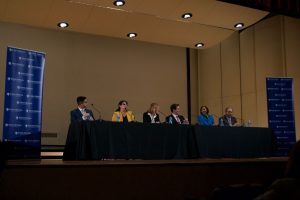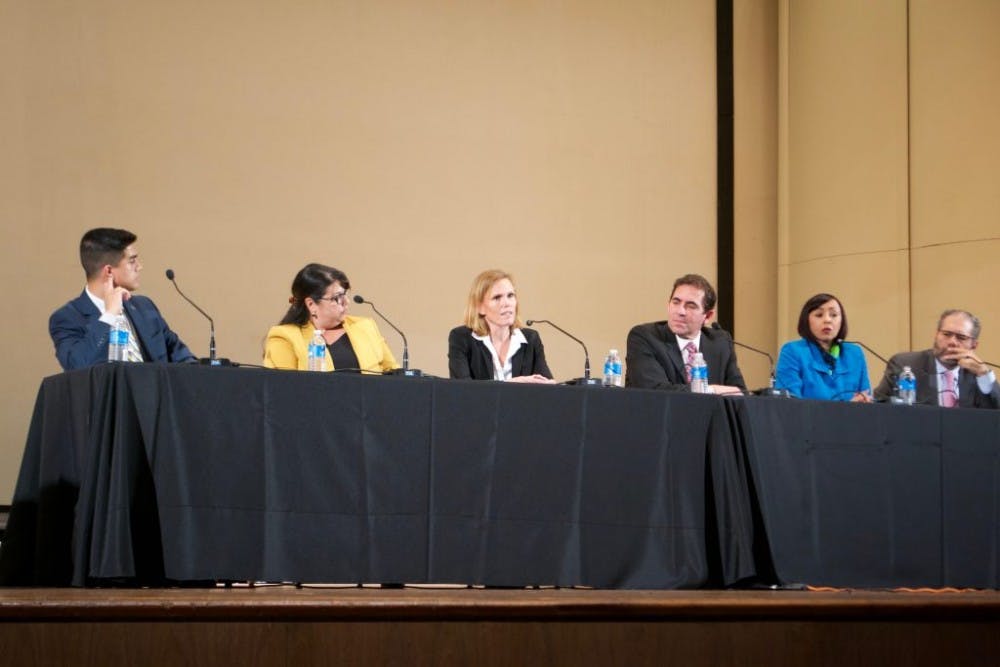Following president-elect Donald Trump’s victory, members of the Latino community in the United States are concerned about the potential impact of his presidency.
The JHU Forums on Race in America hosted five panelists who discussed the implications of the election in the context of Latino identity, economic contributions to society, education and political impact.
The second Forum of the year, “Latinos in America, Post-election” took place Wednesday evening in Shriver Hall.
The panelists included journalist Ray Suarez, School of Education Assistant Professor Ileana Gonzalez, Vice President of the Hopkins Latino Alliance Dinorah Olmos, CEO of Emergent Element Javier von Westphalen and School of Medicine Assistant Professor Kathleen Page. Erwin Hesse, a doctoral student at the School of Education, moderated.
The conversation began with panelists discussing their personal reactions to Trump’s victory. Suarez, a veteran CNN and ABC reporter and former host of Al Jazeera America’s daily program Inside Story, explained how he was taken aback.
“I was as surprised as Donald Trump,” Suarez said. “I did think that given the course of the 2016 presidential campaign, the amount of Latino votes would be higher, that the amount of registered Latino voters would be higher, that there would be more expression of self-interest than there was.”
Gonzalez works as a leader of the School Counseling Fellows Program, which aims to help at-risk youth in cities. She said that after her initial reaction to the election results, she was able to think more clearly about what it could mean for marginalized Americans.
“To move forward from here, from the feelings of shock and awe, now it’s a call to action,” Gonzalez said. “And the question becomes what do we do as citizens to stand up for those who are not as privileged or who don’t have the power to do so.”
Responding to whether Trump’s election will unite or divide Latinos, Suarez first laid out the specific policy areas where Latinos generally agreed and then how Trump’s stances conflicted. Suarez noted that immigration was a major point of disagreement.

“If the new president is at all serious about locating and deporting two million people, I don’t think anybody is thinking how hard, how socially disruptive and just how ugly that would be,” Suarez said. “When you see people loaded into vans in the streets of your neighborhoods, that tends to focus the mind as well.”
Additionally, he identified the environment and global warming as important political topics for Latinos and how Trump’s political agenda fails to identify with Latino values.
“Unlike a lot of the people who voted for Trump, who want to keep digging for coal and burning coal to make electricity, Latinos, more than any other Americans, still tend to work outdoors and know what it means when it’s 115 degrees in the middle of the day in Yuba City, Arizona or 108 in Fresno, California and don’t know what it is like yet to live in a house where you can just close the doors and crank down the thermostat,” Suarez said.
Suarez believes that these specific policies, along with others like healthcare and education, are the driving forces that will either unite or dismantle the Latino community.
“There will be direct political consequences of this election that will have high impact on Latino communities around the country, and that will do one of two things: galvanize political opposition or cause people to draw back, withdraw and say ‘I’m not a part of this and what I think, what I say doesn’t matter,’” Suarez said. “It’s really up to politically active people to push for one of these two outcomes.”
In response to a question about the impact of the Latino population on the economy and whether or not it is important that business leaders appeal to this demographic, von Westphalen, who has experience working as a bilingual and bicultural marketing strategist, stated that Latinos fuel the economic growth of the United States.
“As consumers, business owners and taxpayers we’re helping the economy,” he said. “People need to look at our purchasing power, which will become around $1.8 trillion in purchasing power by 2050, and see that we are helping the growth of GNP and that business leaders need to open their eyes and work with this population.”
Suarez added to von Westphalen’s notion of the integral role of the Latino population in American society.
“When Latinos were one out of 20 Americans in the population, it wasn’t as important how this population was doing,” Suarez said. “Once you’re at about 30 percent, as we are today, this cannot be a wealthy, powerful country without including this population who shares our future affluence, because the degree to which Latinos are a part of our economy, our society, is the degree to which America is a powerful country.”
As a staff member of the University, where Latinos make up only two percent of all faculty and staff, Gonzales shared what she thinks as a Hopkins employee.
“I am the only Latino professor in the School of Education,” Gonzales said. “However, I think that we need to work to really target underrepresented, marginalized populations not only in our students but also in our academia.
“Particularly in education, when we think about who is educating our students, what they look like, where they’re from, what their demographics are, we need diversity to focus on the type of students who bring to the School of Education the reality of what America is.”
Olmos also commented on her position as a Latina staff member at the University.
“Of being a Latina working at Johns Hopkins, I think of three words: pride, challenge and opportunity,” she said. “We are talking about diversity and inclusion, and that is something to me that we really need to work on.”
She continued by presenting the idea that given the number of Latinos in the country, it would be beneficial to the educational growth of this population to hire Latino teachers.
“Many times we fall into the trap of hiring someone who speaks Spanish, but that’s pretty much it,” she said. “But what about someone who can understand culturally that child? What about one in every five kindergartners in America being Latino? Think about that.”
As a self-identifying member of the Hispanic community, junior Anna Garcia found the panel discussion moving.
“It definitely gives me a more optimistic outlook on the events right now, because as [the panelists] said, it’s all about unity going forward,” Garcia said. “There are many things to be scared of right now as a Latino or Hispanic, but more so there are aspects to be hopeful about.”
Olmos left her concluding remarks on the discussion on a unifying note of action.
“We do not have the luxury to not be united,” she said. “This is the best time to change it and make it an example for opportunity, an opportunity to work together and help each other and to be united more than ever. It doesn’t matter if I’m from Mexico, he’s from Puerto Rico, she’s from Cuba — we are here and we need to stick together and work together.”





